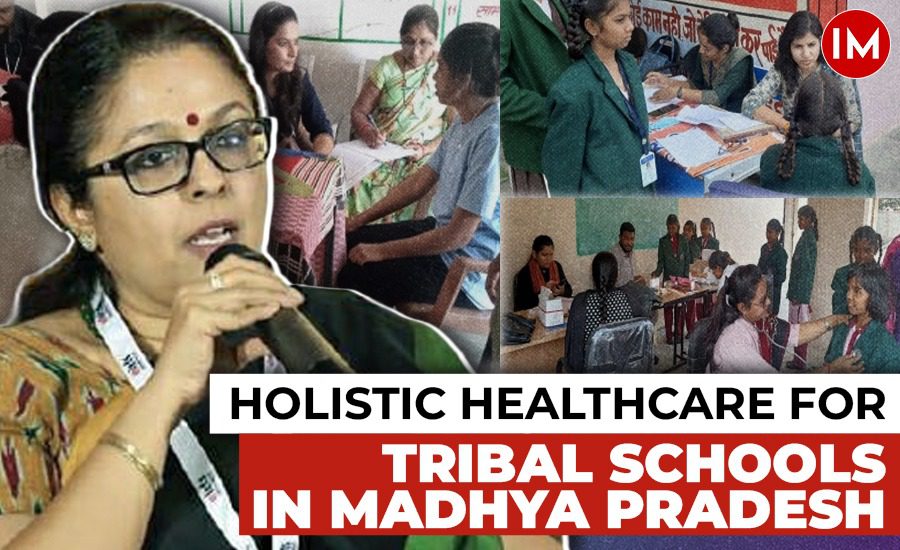Data from sources such as the National Family Health Survey (NFHS) and other relevant studies have underscored concerning health indicators, highlighting the need for additional health-related initiatives for students in tribal schools and colleges across 89 Tribal Blocks in 20 districts of Madhya Pradesh. In response, the Department of Tribal Affairs and the National Health Mission (NHM) under the Department of Public Health and Medical Education have collaborated to launch a special program called Sampoorn Swasthya Karyakram.
The Sampoorn Swasthya Karyakram is a concerted effort aimed at addressing the unique health needs of tribal students in Madhya Pradesh. Administered through the Rashtriya Bal Swasthya Karyakram (RBSK), the program prioritizes the health and well-being of students within tribal communities. Spearheading this initiative are IAS officer Ms. Pallavi Jain Govil, the then Principal Secretary of the Department of Tribal Affairs, Madhya Pradesh, and Priyanka Das, Mission Director of the National Health Mission, Madhya Pradesh.
In an exclusive conversation with Indian Masterminds, Ms. Govil said, “Many tribal communities live in remote areas with little access to healthcare. This makes it harder for students to get the medical care they need on time. Because of this, infectious diseases like malaria, tuberculosis, and waterborne illnesses are more common in tribal regions. Mental health issues are also often ignored, leading to undiagnosed and untreated conditions among students. In these situations, government help is essential.” Ms. Govil is currently serving as DG, Hydocarbon in Ministry of Petroleum & Natural Gas
The Sampoorn Swasthya Karyakram focuses on enhancing healthcare access, tackling malnutrition and anemia, offering mental health support, and promoting preventive healthcare practices to ensure the overall well-being of tribal students in Madhya Pradesh.
COMPREHENSIVE HEALTH EXAMS FOR TRIBAL STUDENTS
The program is based on the National Rashtriya Bal Swasthya Karyakram (RBSK). Each year, a Mobile Health Team, including two Ayush Medical Officers (one male and one female), an ANM, and a pharmacist, visits schools to perform thorough physical exams on students. They use a special MHT kit to check each student from head to toe, test for hemoglobin levels with a digital device, and conduct a solubility test for Sickle Cell Anemia. The exams identify diseases, defects, deficiencies, and developmental delays (the 4Ds).

The program focuses on children aged 5-18. Health records are entered into the RBSK Portal, which tracks those identified with the 4Ds. This information is given to school teachers, who then coordinate with the Block Medical Officer to arrange further evaluation, treatment, or therapy at local hospitals.
TRAINING TEACHERS & STRENGTHENING HEALTHCARE SUPOORT
Ms. Govil added that school teachers have been trained to identify common childhood diseases. With the help of the Mobile Health Teams (MHTs), they can contact the Block Medical Officers to ensure students get referred to the right facilities for treatment. Teachers are responsible for maintaining students’ health and following up on their treatment by connecting the school with the Community Health Officer (CHO) at the nearby Ayushman Arogyam Mandir. The CHO helps teachers meet the children’s primary health needs, keep track of their growth, provide advice on local nutrition and lifestyle changes, and arrange consultations with specialists through teleconsultation when needed.

FUTURE PLAN FOR STUDENT HEALT MONITORING
The program has made great progress so far. Out of 2009 tribal schools, 1952 have been visited, enrolling over 4 lakh children. By April 2024, more than 3.9 lakh children had been screened. Efforts have been made to address all medical issues. Interdepartmental coordination meetings were held to train teachers to understand and manage childhood diseases.
Ms. Jain says the program is ongoing, with a key feature being the implementation of a digital health record system. This system allows continuous follow-up and monitoring of students’ health. Building on the program’s success, the Department of Tribal Affairs plans to issue a Health Card for each child, along with its digitization. This card, maintained by the school principal, will be used for regular growth monitoring through measurements and will inform parents about their child’s growth and development milestones. The Health Card will be issued annually, with a copy given to parents for follow-up. It will also help parents understand the importance of nutrition and supplements for their child’s overall development.

































